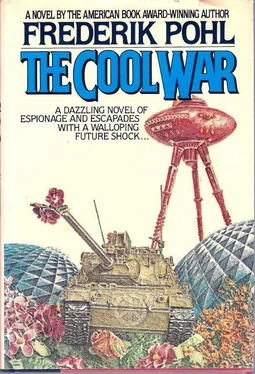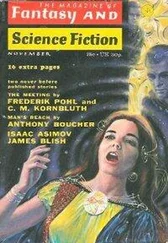“You want that cup of tea, Horny? You wouldn’t want to tell me what this is all about?”
“Well—she’s a girl I know, Art. I’m a little worried about her.”
“I can see that you might be.”
“You mean because she’s in this guy’s harem? Well, sure.” He grinned suddenly. “Sometimes I think I should’ve married somebody like Jessie—younger, of course—when I was still in the wheelchair. Then I might not have these problems.”
He peered around the room, wondering where Art had managed to hide the tapes. Then he said, with some embarrassment, “Art, I can’t tell you how grateful I am—”
“Why should that worry you? You can’t tell me anything else, either, right?” The magician was smiling, but the smile leaked away as he said, “Look, Horny. You’re into some kind of spy thing, aren’t you?”
“Would it make a difference, Art?”
“Not to whether I do what you want, no. But it would make a difference.” Art hesitated. “No offense, Horny,” he said, “but spies are a sad lot. They’re not only immoral, they’re incompetent.”
“Oh, I don’t know if I agree with—”
“I’m not talking about you personally, Horny. I mean the whole industry. Look. I’ll give you a quick test question. Name three cases where any nation in modern times gained anything by spying.”
“Are you serious? Come on, Art! I could name hundreds!”
“Oh? All right. Go ahead.”
Hake frowned. After a moment, he said, “Well, I’ve never taken any special interest in the subject of spying…”
“All right, let me suggest a couple of examples to help you out. For instance, what about World War II? Russian spies told Stalin when Hitler was going to attack. British intelligence learned a panzer division had moved into Arn-hem just before they jumped. Hitler had the time and place for D-Day. The British broke the Luftwaffe code, so they knew their bombing targets twenty-four hours ahead. The Americans broke the Japanese Code Purple, so they had three days’ warning of Pearl Harbor—”
‘There you are!”
The magician shook his head. “Uh-uh. Not one of them used that information! Sometimes they just didn’t believe it, like Hitler and Stalin and Montgomery. Sometimes they believed it, all right, but they were afraid if they acted on it they’d give away their sources. That’s why the Americans got creamed at Pearl, and that’s why Churchill let Coventry burn. So tell me this, Horny. What’s the use of having spies in the first place?”
“Well, there must be other examples!”
“If you come across very many, please be sure to tell me, all right? And that’s only talking about plain spying. If you get into the cloak-and-dagger stuff, the CIA sort of thing, bumping off one foreign politician and starting a revolution against another one, it gets even worse.”
Horny flushed and changed the subject; it was getting a little too close to his own private space. “You keep on surprising me, Art,” he said. “I didn’t know espionage was one of your interests.”
“The totality of human experience is my interest,” the magician said seriously. “Especially when it affects friends of mine.”
“I do appreciate that,” Hake said awkwardly, “but—”
“But you can’t talk about it. Right. So what else is new? Have you had a chance to look over that stuff I gave you a couple months ago?”
“What stuff? Oh,” Hake said, remembering the fiches and cassettes that had been rattling around his bag all over the world, “you mean on hypnotism. No, I’m sorry. I just haven’t had a chance.”
“That I can believe,” Art grinned. “No matter. They’re copies, take your time. More tea?”
It was still daylight, but there was not so much of it left that Jessie wouldn’t notice how long he had been away. Given any choice at all, Hake did not like to lie. He decided to make it possible to tell a misleading and incomplete truth instead by stopping by his church. It wasn’t just for the sake of the cover story. The church was important to Horny, was very close to being his whole life. Being in it gave him a welcome feeling of refuge.
On a hot July afternoon the church was of course empty. The grass needed cutting and the windows were dusty, but there was enough activity in the pizzeria next door to make the whole block seem alive. Cars were whining in and out of the drive-in, and dozens of others were parked—a lot containing couples, one that seemed to contain a birdwatcher, or at least someone who was studying everything around, Hake included, through field glasses.
Hake drove gingerly through the erratic kids and into the church lot. Between his car and the front door he paused every few steps, to pick up empty Coke cartons and wedge-shaped pizza containers.
After the spicy smells from the pizzeria, the interior of the church smelled strongly of must and dust, but it was looking good. The First Unitarian Church of Long Branch now had a new green and gold nubbly carpet down its main hall, in a pattern guaranteed to drink up spilled wine and hide cigarette burns, and the contractors swore that its roof would no longer leak. So the Team was continuing to reward him and his. He eased himself stiffly and painfully into the torn leather chair in his study—that was another part of the payoff, to be sure—and began to make notes for the Buildings and Grounds Committee:
1. Cut lawn.
2. Prov. wst bskts nr pzria (worth trying?)
3. Check roof for leak after next rain.
4. Carpet gntee in safe dep box?
5. Plants watered? Lawn? Shrubs?
He had a list of fifteen items before he was done, and another of ten for Decorations and Special Functions. They were something to give Jessie to show where he had been, anyway. More or less content, Hake got up to prowl the church. All was in order. The familiar rooms were neat, if dusty. The main meeting hall, of course, was not. Social Action had been meeting there again. As he was pushing the chairs back into position and dumping ashtrays he heard a shrill peep-peep-peep from the parking lot.
He stopped and frowned. Was’ there another Tata in the neighborhood? Or another car with the same waspy, petulant horn? He finished quickly and locked up behind himself.
There stood his Tata, crystal bubble and bright yellow paint. But as he slid under the bubble he saw a note pinned to the steering wheel:
Our bargain still holds. Get out of this car at once.
It wasn’t signed, but it didn’t have to be. It was one of the Reddi brothers, of course. He sat paralyzed for a moment, and then it penetrated his mind that “at once” might very well mean “at once.” He slid out from under the bubble and stepped back, looking around for someone to talk to about this unexpected problem.
There was a faint hissing sound from the car, a little like the buzz of a young rattlesnake.
Hake had learned something Under the Wire. He dropped flat on the damp asphalt. There was a blast of white fire and a crack like a giant whip. The shattered crystal bubble flew into the air; the yellow chassis of the Tata peeled outward, and it began to burn.
It was not a very big explosion. The hydrogen fuel was mostly in solid suspension in metal, and it burned rather than blowing up. But it was enough to destroy the car, and it surely would have been enough to destroy Hake, too, if he had been inside it.
When he was through with the police, and the firemen, and when the wrecker had come to tow what was left of his three-wheeler away, one of the policemen walked him to the door. He didn’t need it; he wasn’t hurt. But he was glad enough for it, except for the cop’s conversation, which was about how unsafe your hydrogen cars were compared to your good old gas-burners—
Читать дальше












